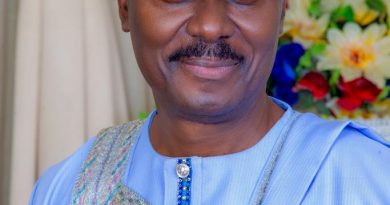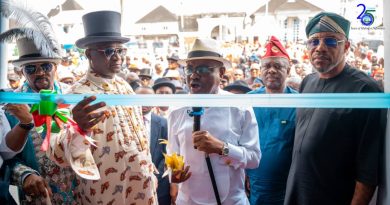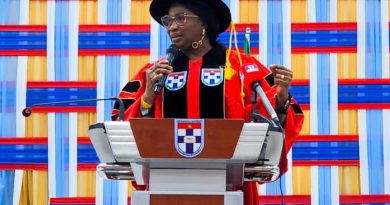Fish Out Misfit Among Traditional Rulers, Olowu Urges Govt
Olowu of Kuta , Oba Adekunle Oyelude Makama, CON, Tegbosun iii, has said that there exist in the rank of traditional rulers in the country some cultural misfits who would not want to uphold the culture and tradition of their people.
He subsequently challenged government authorities in charge of the appointment of royal fathers and scholars in the nation’s ivory towers to fish out those cultural misfit traditional rulers.
Olowu spoke shortly after receiving an award in recognition of his activities towards the promotion of Yoruba culture and tradition from Osun State University, Osogbo, on the sidelines of the 14th Toyin Falola International Conference on Africa and the African in Diaspora held on Tuesday at the UNIOSUN main campus in Osogbo.
“Within the traditional institution, don’t shy away. Some of us (traditional rulers) thought we could be on the throne and change the goal post halfway.
“No, we are installed culturally and we don’t have any role articulated by the Chieftaincy Law other than being traditional rulers for the maintenance of tradition and culture.
“We have a lot of cultural misfits among us. Please help us to fish them out and correct it because of posterity,” Olowu Kuta said.
Speaking further, Oba Oyelude, who was honoured alongside Eburu of Iba, Oba Adekunle Adeogun-Okunoye, the Aragbiji of Iragbiji, Oba Abdulrosheed Olabomi and the Orangun of Oke-Ila, Oba Adedokun Abolarin, urged scholars and opinion moulders to assist in promoting several positive stories about Nigeria to the outside world.
He said, “In the past, the late M.K.O. Abiola started the project called reparation and we have seen the fruits of his efforts today. Many of the artefacts and the bronze are being brought back.
“This project of UNESCO partnering with the University of Texas in Austin and Osun State University (UNIOSUN) is not a small feat. It is something to reckon with when we use culture to reshape our image worldwide.”
Earlier, in his welcome address titled ‘Culture Matters,’ Prof. Toyin Falola, in whose honour the conference was named, said that beyond preservation of people’s way of life, culture also remains a catalyst for creativity.
He recalled, “Throughout history, colonisers did not just take the African land. They tried to erase the African culture. They changed African names, outlawed African languages, made a mockery of African religions, and imposed foreign systems. They did all of these because they understood that to capture a people, you must destroy their culture.
“Culture, hence, is a tool for political power. Our ancestors resisted the colonisers not always with weapons but many times with language, with the rhythm of their drums, with their knowledge of culture. In the present day, symbols of culture like statues, official languages and holidays are still political tools.
“They pass across messages about who belongs, who matters, who is remembered. That is why decolonising African education, literature, and public space is not merely symbolic but a fight to reclaim cultural dignity.”
He noted that culture also plays a role in development, explaining that when development projects are initiated with minimal or no understanding of the culture of the people they aim to help, the result is often failure, resistance and waste.
He warned, “To lose culture is to lose a part of ourselves. But to protect culture, to invest in it, to learn from it and to pass it on is an act of survival. It is resistance.”
Before declaring the conference open, the Vice Chancellor, Osun State University, Clement Adebooye, while addressing the gathering, commended the Board of Toyin Falola International Conference on Africa and African Diaspora in conjunction with the UNESCO-IFCD-UNIOSUN Cultural Project, the UNIOSUN College of Humanities and Culture, and the Department of History of the University of Texas, Austin, United States of America, for organising the international conference.
Describing the conference as historic, Adebooye said the institution had the honour of being the first university in Nigeria to win the UNESCO Research Grant on culture.
He added that the plans had been concluded by the management to strengthen its teaching capacity and enhance the research productivity of the academic staff in the broad area of culture.




